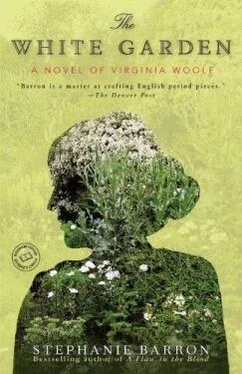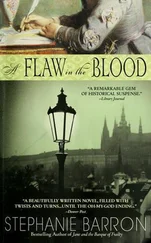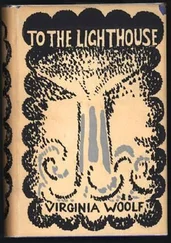Dread curled in the pit of Jo’s stomach. “Why did she go to Harold Nicolson in the first place — Why couldn’t her husband protect her?”
“Because Leonard Woolf was one of Keynes’s ‘Cambridge friends,’” Peter said patiently. “Leonard was an Apostle, remember?”
Ivy Gupta’s slim brown form appeared in the doorway; she did not speak, but the very blandness of her expression was a summons. The Archive was closing.
Peter ignored the librarian. “Did you notice this faint handwriting at the foot of the letter?” He held the copy of the letter under the desk lamp that anchored one end of the research table. “It’s not the same as Nicolson’s. Much more crabbed. Can you make it out?”
Ms. Gupta cleared her throat warningly.
“I think that word is burned,” Jo suggested.
“Burned? Possibly… What about buried? Yes, I’m almost certain it’s buried. Buried Rodmell April . Now what does that mean? If it’s Keynes’s hand — ”
“Then he was closing the file, so to speak,” Jo said thoughtfully. “Keynes buried something at Rodmell in April. Where’s Rodmell? It sounds familiar.”
“It should. Virginia lived there. I told you. A place called Monk’s House. It’s not far from Charleston.”
Buried Rodmell April .
Jo’s heart sank; of course there was a burial in April. At the close of that month in 1941, Virginia Woolf’s body was fished from the River Ouse.
What if something else had been buried with her? Something that had worried Maynard Keynes far more than Virginia herself?
“Aren’t you dying to know,” Peter muttered as they returned the microfiche and the contents of the Tilton file, “who that Dutchman was — and why he died?”
GRAY WESTLAKE DIDN’T EVEN ATTEMPT TO CALL JO THAT evening. The knowledge that she’d lost the notebook she was supposed to be tracing — and was still running around England with this guy from Sotheby’s, when she knew that he, Gray, had flown all the way to London simply to be with her — had changed his attitude in a matter of seconds. It was clear that Jo didn’t give a shit about him. She’d turned her back when he’d opened his heart and mind in a way he’d no longer thought possible — when he’d shown her his trust, and vulnerability. Gray thought of some of the things he’d said before she ran out of his hotel suite, and felt searingly embarrassed. Jo hadn’t even done him the courtesy of telling him the truth, to his face.
I can’t buy her, goddamn it .
And with that thought, he missed her acutely. It was possible she was the only person who’d ever been out of his reach.
Gray had called the Connaught and reserved a room for Imogen Cantwell, packed her off in a taxi, and walked away down New Bond Street.
He’d toyed with the idea of heading for Gatwick, where his jet was idling. Maybe it was time to give up and go home. There would be a certain satisfaction in pulling out of this mess right now — Jo might even be arrested! — when he, Gray, could so easily save her. He had a sudden vision of the Woolf manuscript, retrieved from that Oxford professor tomorrow morning, and a tongue-tied Jo attempting to thank him for keeping her out of prison. He’d tell her then, with the ruthlessness he was known for, that she was no longer in charge of designing Westwind’s gardens. That her expenses for this bizarre week in England were her own. But the impulse died a swift death. The notebook was no longer the point — she’d given it away. It didn’t matter whether Gray bought it or not. There was no guarantee he’d ever see Jo again.
He walked on, heading south down the Strand toward the river. The absolute dark of a north European night was falling swiftly over the city; London was all black cabs, shining headlights, the sudden stab of neon. It was rare for Gray to be entirely alone — he hired people, he married them, in order to avoid solitude — but tonight the loneliness was welcome. It clarified his thoughts.
What was Peter Llewellyn like? What spell had he cast over Jo?
What does he have that I don’t?
There was a restaurant just opposite — a simple sign, a sheltered doorway: RULES. Gray thought vaguely that he’d heard of it before. A steak, perhaps. A double scotch on the rocks. The table tucked into a fold of drapery, no one but the waiter coming near.
He would eat a good meal. Think things over. Then go back to the Connaught and ask them to hold all calls. He would fire up his laptop and compose an email — a private one, to the head of his investment firm’s research department.
Find out all there is to know about Margaux Strand, Oxford professor, and Peter Llewellyn, Sotheby’s employee, before nine A.M. Greenwich Mean Time .
“HERE.” PETER SHIFTED HIS CHAIR AROUND SO THAT Jo could view the computer screen. “That’s our boy. Jan Willem Ter Braak. Found shot to death in an air raid shelter here in Cambridge, of all places, on the first of April, 1941.”
Peter had accessed the online archives of The Times while they waited for Indian curry at an Internet café. He was drinking beer, while Jo opted for white Burgundy; the smell of roast chicken and yams was making her mouth water.
She focused on the death notice; it was extremely brief. Dutchman Apparent Suicide , ran the headline. The body had been discovered on the morning of April 1, 1941, with a gun beside it. Jan Willem Ter Braak was described as a Dutch refugee resident in England since the British evacuation of Dunkirk. No other details of the death were mentioned. Anyone with information regarding Ter Braak, the paper suggested, should inquire at the Cambridge police station.
“Not very useful, is it?” Peter observed.
“An air raid shelter! Weird place to commit suicide. How’d he know it’d be empty? — We have to assume it was empty, right? The article doesn’t mention any witnesses.”
“It doesn’t mention much at all.”
A waiter set down a plate of flatbreads, topped up Jo’s water glass, and left a trail of wet spots over the plastic table. She tore into a pappadam; steam burst from the center.
Peter was at his keyboard again. “Here’s a Wikipedia entry on the same fellow.”
“He’s that famous?”
“He wasn’t Dutch at all. He was a German agent named Engelbertus Fukken.”
“No wonder he preferred Jan . So you’re saying he was a Nazi spy?”
“Rather. The article says Ter Braak parachuted into England six months or so before he killed himself. He took rooms in Cambridge, claiming to be a Dutch national evacuated with British forces from Dunkirk.”
“But why kill himself if he was supposed to spy? That doesn’t make sense.”
“Apparently he ran out of money at the end of March ’41 and couldn’t stick it.”
“Because he was broke?” Jo frowned. “I’m sorry, but that doesn’t seem very James Bondish to me. Couldn’t he have robbed a bank?”
“Maybe he was afraid he’d be caught. And forced to betray the Reich. So he took the gentleman’s way out.”
“In an air raid shelter. That was unusually empty.”
Peter seemed determined to ignore her contempt. “Here’s something odd. Ter Braak went missing from his boarding-house on the twenty-ninth of March.”
“The same day our journal begins.”
Peter looked at her. “But the body wasn’t found for three days.”
“It can’t have been lying in the shelter all that time,” Jo said decisively. “So Jan was somewhere else. And he definitely didn’t shoot himself. He was kidnapped, killed, and finally dumped in that shelter April first.”
Peter gazed at her pityingly. “Is it American, this need for drama? You never accept the obvious solution, do you? It’s all conspiracy, in your mind. The national disease, where you come from.”
Читать дальше












